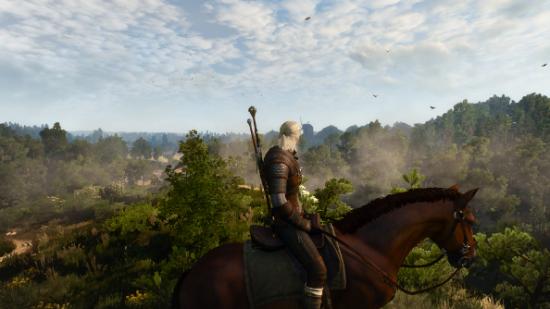For two games, Geralt – the eponymous Witcher, whose voice is like the low rumbling of thunder – has been a victim of the Wild Hunt. He was stricken by amnesia before the events of the first game, but now the pasty-faced, grey-haired White Wolf has recovered his memory and begins his own hunt for Ciri, his adopted daughter, the prize the Wild Hunt is chasing.
It’s a much more personal tale than either of the previous Witcher games, exploring Geralt’s history and relationships, both romantic and platonic, but it’s still vast in scope, and a great deal of effort has also gone into developing the dark fantasy world and its denizens. Despite his urgent quest, however, he’s still able to go off gallivanting and do what he does best: killing monsters.
Now he’s doing it in a huge, mostly open world, too. That means more monsters to kill, more nooks and crannies to explore for relics, alchemical ingredients and monster dens and more quests than you could possibly keep track of without a quest log. And it stands as a lesson in how to make an open world game that’s filled with compelling content instead of inane busywork.
Want more Witcher 3? Here are the best Witcher 3 mods.
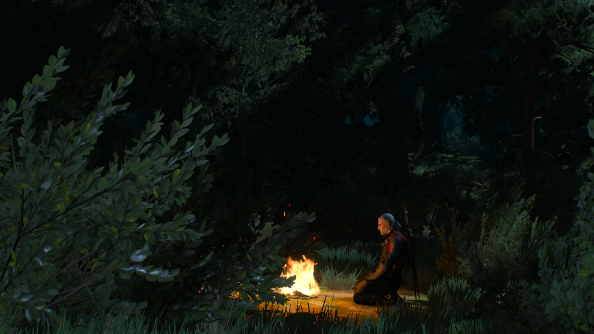
There’s a common boast that the marketers of open world games make, concerned with the number of hours of content that these massive games contain. “Hundreds of hours,” they yell from the rooftops, and it seems to work, because more and more, folk have become obsessed with the idea that a £40 RPG needs to be a certain length to be worthwhile. Thus, open world games have been padded out with filler content to make them even longer.
The Witcher 3 bucks this trend, as CD Projekt Red have lavished the game with elaborate, twisting and turning quests everywhere you look. Instead of looking for collectibles or 20 bear skins, even the most mundane diversions usually involve hunting down legendary monsters and magical armour, rewarding players with an inventory full of treasures and, more importantly, some brilliant stories.
Even diversions like horse racing and Gwent, a collectible card game, respect a player’s time, offering valuable rewards without much faffing around. The horse races are some of the best ways to get saddles, blinders and saddlebags for Roach, Geralt’s loyal steed, while Gwent is an interesting time sink with a bunch of themed decks based around different armies, special cards and opponents everywhere.
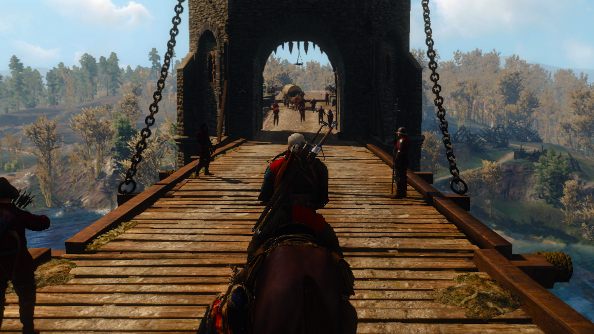
The main quest sees Geralt searching for and eventually protecting his adopted daughter, Ciri, who also happens to be the subject of a prophecy and is the actual daughter of the Emperor of Nilfgaard, ruler of an expansionist, aggressive empire. He gets help from returning chums, like on again off again lover, Triss, on again off again lover, Yennefer, and just a good friend, Dandelion the bard, who narrates portions of the game.
If you’re not familiar with Geralt’s crew, not to worry. Knowledge of the previous games and the books is a boon, but detailed in-game biographies shore up any gaps, and there’s ample opportunity to get to know his old friends through major secondary quests.
The lines between different types of quests – there are main quests, secondary quests, monster contracts, treasure hunts and points of interest dotted all over the map – are thoroughly blurred, and they bleed into each other, transforming multiple quests of different tiers into a cohesive, compelling narrative. You never know when a simple monster contract is going to turn into something considerably more elaborate.
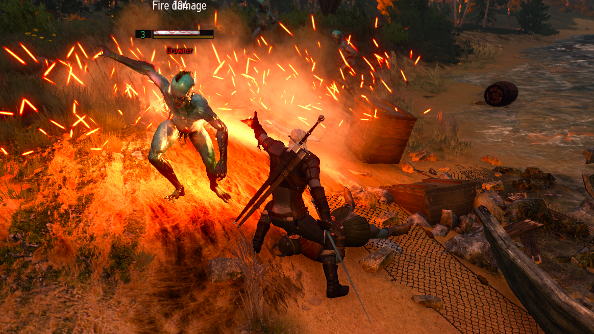
I was riding around on Roach, who has proved to be a handy companion when he’s not getting stuck or suddenly stopping and whinnying, looking for points of interest to explore. They can be found all over the world, and they can be anything from a monster nest that needs to be blown up to a bandit camp. Usually they are short diversions with a spot of combat, but sometimes they lead to tantalising treasures or the rescue of an NPC who will later become a shopkeeper with unique wares. In this instance, I’d just found a few monster dens, but my inventory was getting a bit full, so I headed to nearby village to sell some loot.
Most villages contain a signpost that allows you to fast travel to other signposts, which is convenient but also threatens to make the world a bit smaller. I rode there, because there’s always a chance of uncovering something interesting on a journey, and sometimes it’s simply nice to ride through the gorgeous landscape, admiring the striking skybox and rich, dark forests. Arriving at the village, I discovered that there was work for a Witcher.
A lot of locations host noticeboards where quests and monster contracts are pinned up, though many of them can also be embarked upon by simply overhearing a conversation. Usually the villagers don’t have a clue what the monster actually is, since they don’t know their manticores from their spirits of dead, miscarried babies (the difference is that the latter is infinitely more horrific and disturbing). Unfortunately, like all of the game’s quests, you’ll never know if it’s something you can tackle at your level until you accept it.
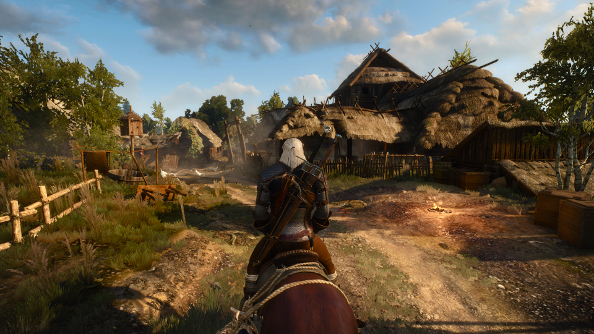
There’s no level scaling and while you’re expected to tackle the three main areas of Velen, Novigrad and Skellige in that order, that doesn’t mean that Velen only has low level quests. I walked around for 30 hours with a monster contract I got quite early on before I was able to actually handle it. The reason for this is that, after you’ve reached a certain point in the story, you’ll probably be jumping around between the three regions a lot, so each area has been furnished with quests and enemies that can be tackled later on. The downside of that is being stuck with loads of quests that you’ll have to wait for tens of hours to actually start.
Thankfully, the contract I picked up from this notice board was in my level range, and since I never turn down a good monster-slaying quest, I agreed to help. And because I’m a nice guy, I didn’t even make Geralt haggle for the reward.
Monster contracts tend to follow a particular formula, with Geralt first questioning people about the monster, tracking it and then killing it. The investigation usually reveals what species the monster is, and by reading the bestiary entry you can swot up on some lore and also find out its weaknesses. All monsters have to be killed with Geralt’s silver sword, while his steel sword is for the killing of humans, dwarfs, elves and animals, but beyond that they might be weak to a specific type of bomb, a magic spell (known as signs) or a particular oil that can be applied to the silver sword.
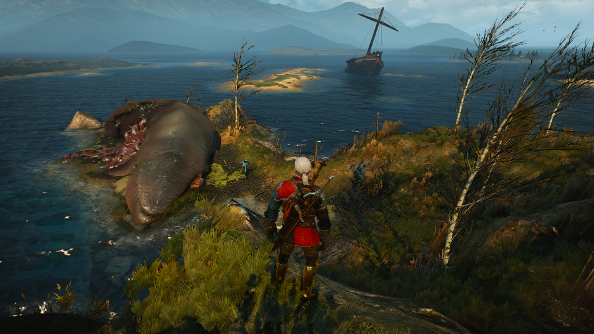
There’s a bewildering array of things to craft and upgrade, and strewn throughout the world are diagrams that unlock more craftable items. Some are tied to quests that span the entire world, sending Geralt off on a huge adventure, exploring troll-infested caves and ancient, crumbling castles.
The crafting system hits that sweet spot between convenience and complexity. Crafting materials for potions, weapons, armour, bombs and oils can be found everywhere, in fields, forests, on monsters and in shops. On the occasions where I wanted to craft something but didn’t have all the components, I’d usually discover that I actually did have what I needed, but first I had to break down items or craft the components first. In the case of bombs and potions, once you’ve crafted them, your supply can be replenished during meditation (essentially resting) at the cost of alcohol, inexplicably, which is very common. So there’s no need to hunt down those rare herbs all over again.
With my potions, bombs and oils ready, I ventured out to face the monster, and after all the preparation it proved to be an easy fight. Even the particularly hard ones can be rendered a little less exhausting with the appropriate tools, signs and some good timing, though.
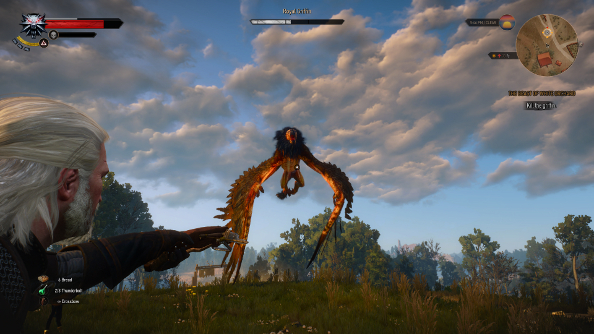
There’s quite a bit of flexibility when it comes to building Geralt. Ability points are gained when you level up or discover places of power, and they can be spent on his martial ability, his signs, alchemy and passive abilities that allow him to generate stamina faster or confer more vitality points. These then inform the choices you make when it comes to his armour, since heavier gear offers more protection at the cost of stamina, which is used in casting signs. Similarly, different weapons favour sign-casting or more direct damage.
No matter how he’s built, however, Geralt’s going to be an up close and personal fighter. Combat’s a lot like The Witcher 2’s, or at least the Enhanced Edition. It’s all about moving around, dodging and rolling all over the place, trying to get behind an enemy’s defenses or away from their attacks. Parrying’s handy, too, and attacks are usually clearly signalled, giving just enough time to press but not hold the block button, which gives Geralt an opportunity to counter attack.
Throwing signs into the mix, Geralt’s able to set fire to enemies, knock them down so they can be instantly killed (if they are flying enemies, it’s better to use the crossbow and knock them out of the sky) and, my personal favourite, he can manipulate their minds temporarily and set foes against each other. Signs can also be used out of combat, to smash down walls, addle minds in dialogue and to light candles and braziers. The latter isn’t all that helpful, but I confess that I became obsessed with lighting every bloody candle in the whole game.
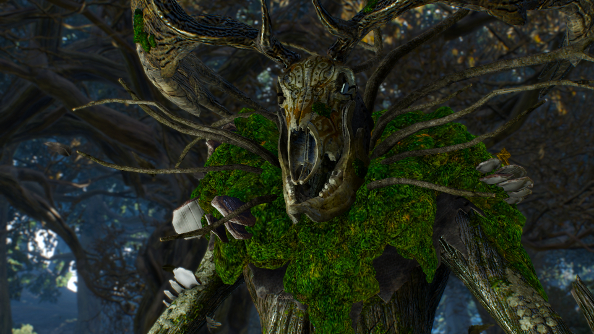
This hefty arsenal and big box of tricks makes Geralt perhaps a little too powerful, especially by the game’s halfway point. Enemy AI is very basic, with the only sign of intelligence being that sometimes they’ll move backwards to get out of Geralt’s way, so it’s only through sheer numbers or lots of health that they are able to pose a challenge on the normal difficulty. It’s worth increasing it once you’ve learned the basics.
With the monster dead (something that isn’t inevitable as monsters aren’t inherently bad, and you can occasionally let them go on their merry way) I headed back to the village with my trophy in tow. I expected to get paid so I could go off on another adventure, but the game had other plans in mind for me, including imprisonment, a farce of a trial, a favour owed to a powerful man and a journey into some very trippy caves with a band of warriors. I did get paid, eventually, but what had started as a very simple mission unravelled into a mystical, epic adventure.
Not every quest will lead to some grandiose Argonautica-style adventure, but they are blessed with an interconnectedness, rarely existing in a vacuum. Sometimes that just means that a character rescued in one quest will be a quest giver in another, but they often lead to much more interesting consequences.
Interesting, but also very grim. The Northern Kingdoms, where the entirety of the game takes place, is a thoroughly tragic place. There’s the big stuff, like the war, the persecution of mages and non-humans, dodgy religions, but it’s the smaller, personal tragedies that cut the deepest. It sometimes seems like everyone is suffering somehow, and there’s no easy fix.
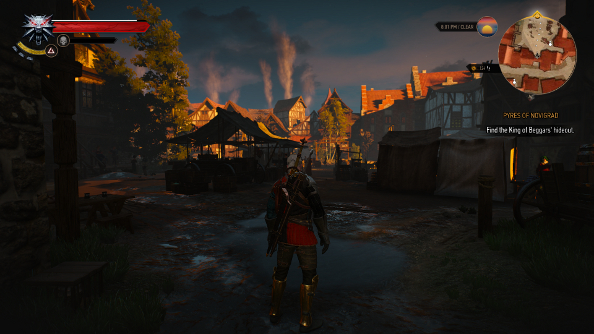
Geralt isn’t your typical legendary hero because, despite the huge events he’s been involved with and the impact he’s had on the world, he often finds himself unable to really solve people’s problems. As a monster hunter, for instance, he’s more often than not being paid to get revenge, killing a beast that’s already taken victims. And, unfortunately, the death of the monster doesn’t fix everyone’s troubles. People are still dead, the living are still victims of war and poverty, and the world remains a predatory place where the vulnerable have short, painful lives.
The desperate state of the world is greater emphasised by complex moral quandaries that both Geralt and the people he assists and hunts make. There are times when, in an attempt to help, Geralt only leaves places worse off than when he first arrived, and it’s rarely clear what the cost of a decision will be, or who it will affect. Over the last week, I’ve found myself eyeing up previous saves several times, because I couldn’t stand what my actions resulted in. It’s hard to accept that killing monsters and saving lives doesn’t always end in a happily ever after moment.
Although he’s a drifter, Geralt gets to know a lot of people intimately – and I’m not talking about the very awkward shagging – as he travels the world. He listens to their woes, their fears and their prejudices, and a great deal of time during quests is given over to developing what can often be, in the grand scheme of things, rather minor characters. It’s a great part of why I’ve found myself becoming so attached to the miserable world. After peering into windows of so many lives and eventually becoming entangled in them, I can’t help but feel responsible for what happens to these people.
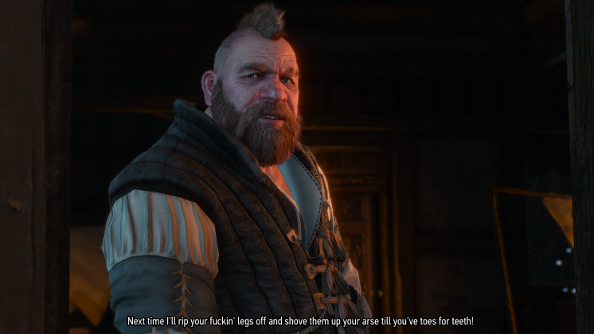
While the main plot and side stories are excellent, full of surprises and bubbling with emotion and intensity, the dialogue can be, because it is fantasy, a wee bit silly. It’s still produced countless memorable characters – though the writing perhaps relies on fantasy stereotypes, like buxom sorceresses, a bit too much – and is elevated by a great voice cast who manage to sound sincere even when they are yammering nonsensical curses and made-up words or pretending to be extremely drunk. And there are moments when, even though an oppressive fog of misery hangs over everything, it’s actually funny. Geralt, despite being a stoic chap, is fond of very bad jokes, and gosh do I love them.
It’s a good thing that the dialogue is competent, sometimes great, because you’ll be hearing a lot of it. I’m still marvelling at the fact that, despite the countless secondary quests and monster hunts I went on, I was still listening to unique conversations with characters that had personality and at least a bit of a backstory right up until the end. Never was I faced with someone just telling me to kill something – there were always new stories and characters. And given that I’ve put in around 90 hours, it’s impressive that CD Projekt Red didn’t run out of steam.
As is tradition, when it comes to open world games, The Witcher 3 is lamentably lousy with bugs. NPCs get stuck, monsters stop fighting, the occasional quest breaks and the game seems to be prone to crashing for myriad reasons. I managed to solve my own crash issues by switching the FPS from 60 to unlimited in the graphics options, but after the 1.03 patch, it started to crash again.
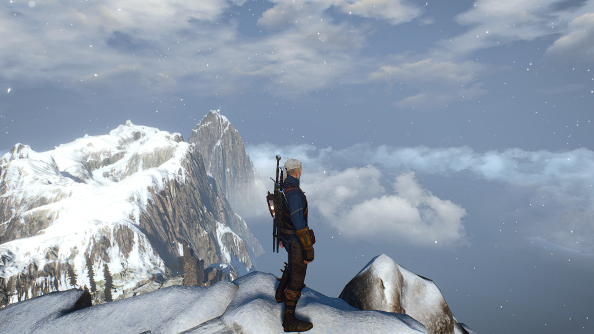
Despite the crashes, which for me occur only once every 5 hours, but happen a lot more frequently for others, The Witcher 3 runs as expected. With my Intel i5-3570K @3.40 GHz, 8 GB of RAM, GeForce GTX 970, Windows 7, playing at 1080p, I get 50-60fps with ultra settings if I turn off Nvidia’s fancy HairWorks, which isn’t really worth the 10 frames I lose when I turn it on.
It’s a stunning game, even though it doesn’t look as impressive as the in-engine trailer shown off at VGX a couple of years ago. Even after all these hours, I still delight in merely riding through forests, quaint villages and the massive city of Novigrad, all of which bustle with life. It’s a world in motion, with people going about their business, animals hunting and the wind making the trees dance. I’ve spent hours just aimlessly enjoying the eye candy. I could do without all the water, though. It’s eerily still, even at sea, and it looks like ink. It’s horrible to swim through, too, thanks to imprecise, sluggish controls and the level of murkiness.
There seems to have been some concessions made due to the fact that it’s a multiplatform game. The UI feels like a strange hybrid between a PC UI and a console UI, but ultimately there are still plenty of PC features like menu shortcuts, a customisable HUD and a “sort” button for the inventory. If only there was a quick way to hide the HUD entirely.
Perhaps The Witcher 3 could have done with another month or so of extra development to work out the kinks, but even without the extra time it’s an enormously impressive game that proves, in case there was any doubt, that gargantuan games don’t need to be stuffed with forgettable filler guff. Any worries that, by making the game open world, CD Projekt Red were just following popular trends should be set aside, because The Witcher 3 dances to its own tune. There isn’t an RPG like it out there, not even its predecessors, and its uniqueness should be treasured.
9/10
